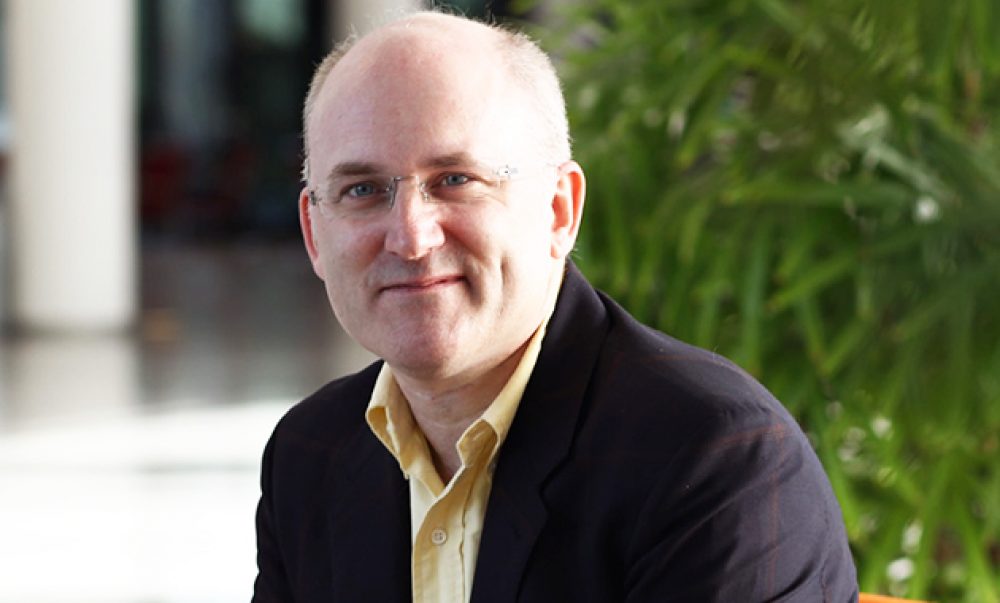The 157 Group is set for expansion following a strategic review, chief executive Ian Pretty has revealed in an exclusive interview with FE Week in which he claimed that up to 15 colleges had already asked about signing up.
The results of the review were explained at an event in London on Thursday (January 14) and Mr Pretty, who took over from executive director Dr Lynne Sedgmore in September, said members told him they wanted the group to grow.
Mr Pretty (pictured above), whose previous roles included senior roles in HMRC, the Cabinet Office and Capgemini, told FE Week: “The members wanted to take the 157 Group in a different direction, which is why they took the conscious decision to hire someone from outside the sector.
“What I said to them was in order to create this new mandate for the 157 Group we need to undertake a strategic review — the members agreed.”
He added: “Our members have agreed that we should look to take on new member colleges. We have 26 members at present and there has been discussion over whether we want to have more or less in future. We decided to look at expanding.
“I am aware that anywhere between 10 and 15 colleges who have expressed an interest in joining us, with the bulk of those contacting us over the last six months.”
26 @157Group colleges right now but talking to other forwarding thinking colleges. Watch this space. https://t.co/hb74iADM50
— Ian Pretty (@IanPretty1) January 14, 2016
The 157 Group is now based at Ealing, Hammersmith and West London College, which according to the representative organisation’s website was still a member, even though it was hit with an inadequate Ofsted rating in December. It indicates a relaxation of previous membership guidelines, as Dr Sedgmore said in March 2014, with an “honourable agreement” existing among members that they would “voluntarily leave” if served with a grade four Ofsted rating.
Mr Pretty said: “A set of new attributes have been agreed to assess any future requests from a college to join. Colleges would typically be large, diverse, technically and professionally focused, employer facing, focused (or aspiring to focus) on level three four and five provision and successful.”
But, he said: “Ofsted grades one and two are regarded as successful, but inadequate is not, but there are other factors to be taken into account. There are a number of indicators of success that could be considered, for example if a college has been given a Beacon Award or impressive success rates.”
Mr Pretty acknowledged the 157 Group “was previously very focused on influencing government policy”. But he said following the review “we want to move toward a heavier focus on policy implementation — so, for example, how we can work with the government to help in area such as the development of Institutes of Technology and technical and professional education pathways including apprenticeships.
“I’m of the view that there is little to be gained from spending an awful lot of time on trying to affect a policy decision,” he said.
Mr Pretty said that over the next five years members aimed to, for example, support devolution, find alternative funding streams to government payments, and identify cost efficiencies which “means effectively collaborative buying” for example with energy suppliers.
Visit the research section on the 157 Group website for more details of its new strategy.
Editor’s comment
Stick to founding principles not floundering principals
The 157 Group was set up in 2006 because of a perceived gap in the market.
Sir Andrew Foster described in paragraph 157 of his review of FE colleges the need for “greater involvement of principals in national representation”.
Specifically, “those from larger, successful colleges where management capacity and capability exists to release them for this work.”
The Association of Colleges represents nearly all colleges, so Foster’s paragraph 157 spawned a new membership organisation, with very particular “large and successful” entry requirements.
Jump forward a decade and the 157 Group has its second boss in chief executive Ian Pretty consulting with members as to where to take the organisation next.
Growing the large and successful college membership is to be encouraged, but at what cost to the group’s reputation if unsuccessful colleges aren’t politely shown the door?
Foster was right that the FE sector needed a 157 Group and I wish Ian and the new team another decade of success.
Chris Henwood
chris.henwood@feweek.co.uk


Your thoughts